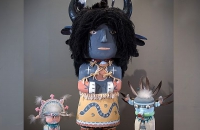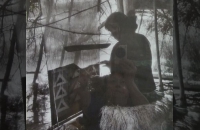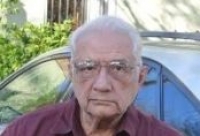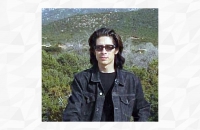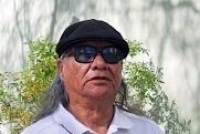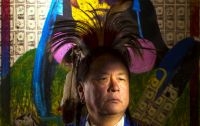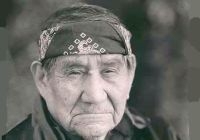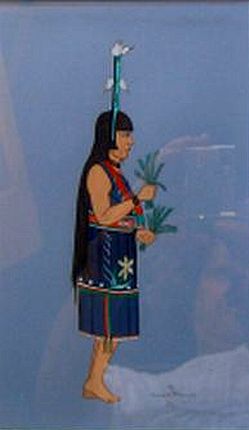
Gilbert Atencio - Wah Peen
+ Add A (1930-1995) rtist to My Preferences
Gilbert Atencio (Wah Peen) was born in 1930 in Greeley, Colorado and He was the son of Isabel M. Montoya and the nephew of Maria Martinez. He was educated at San Ildefonso Day School and graduated from the Santa Fe Indian School in 1947. He served in the U. S. Marine Corp and lived most of his life in Santa Fe, New Mexico.
Much of Atencio's inspiration for paintings came from stories his aunts told him about their lives. His style varied from the traditional flat style done early in his career, to abstract or semi-abstract paintings done in the 1980s. Towards the end of his life Atencio said about his work:
“I do my paintings both for myself and for other people, especially for people who enjoy Indians, their way of life, their ceremonies. The people who buy my paintings are that type of people. They know some history of the Pueblo Indians. I do it for myself and for them.
“For the non-Indians who buy my work, I do it so they will appreciate Indian art and understand the Pueblo Indians—for more understanding between non-Indians and Indian life. If they come into the pueblo and if they have a painting of a certain dance, they known that what I have painted is the old version, and what they are seeing now—even though the young girls have cut their hair—is still the same dance. And so, appreciate the dance. Have respect for the way. ” (Wyckoff, p. 66)
Atencio has won numerous awards for his artwork, including: Prizes in 1972 and 1973 at the Heard Museum Guild Indian Fair and Market, Phoenix, Arizona; the Grand Award at the Inter-Tribal Indian Ceremonials; the Rogers Award in 1962 from the Museum of New Mexico, Santa Fe; New Mexico State Fair, Albuquerque, New Mexico; the Grand Award Philbrook Art Center Annual Indian Art Exhibition, Tulsa, Oklahoma; and two first prizes, in 1962 and in 1963 from Scottsdale National Indian Art Exhibition, Scottsdale, Arizona. He also served as Governor of San Ildefonso Pueblo in 1966.
Atencio's work is in numerous collections, including: Amerind Foundation, Douglas, Arizona; Bureau of Indian Affairs, United States Department of the Interior, Washington, D.C.; Denver Art Museum, Denver, Colorado; Thomas Gilcrease Institute of American History and Art, Tulsa, Oklahoma; Heard Museum, Phoenix, Arizona; Institute of American Indian and Alaska Native Culture and Arts Development, Santa Fe, New Mexico; Indian Arts and Crafts Board, Denman Collection, United States Department of the Interior, Washington, D.C.; Liberty National Bank and Trust Co., Oklahoma City, Oklahoma; Museum of the American Indian, Smithsonian Institution, Washington, D.C.; M. H. De Young Memorial Museum, Fine Arts Museums of San Francisco, California; Museum of Northern Arizona, Flagstaff, Arizona; Museum of New Mexico, Santa Fe, New Mexico; Philbrook Art Center, Tulsa, Oklahoma; Read Mullan Chevorlet Corporate Collection, Phoenix, Arizona; School of American Research, Santa Fe, New Mexico; and Southwest Museum, Los Angeles, California.
REFERENCES:
Brody, J. J. Pueblo Indian Painting Tradition and Modernism in New Mexico, 1900-1930. Santa Fe, NM: School of American Research Press, 1997.
Lester, Patrick D. The Biographical Directory of Native American Painters. Tulsa, OK: SIR Publications, 1995.
Wyckoff, Lydia L., ed. Visions + Voices: Native American Painting from the Philbrook Museum of Art. Tulsa, OK: Philbrook Museum of Art, 1996.
Gilbert Atencio (1930-1995) is a name synonymous with classic two-dimensional style paintings at San Ildefonso Pueblo. He is undoubtedly one of the most famous of the painters yet he also made a few pieces of pottery throughout his career. Gilbert was a son of Isabel Montoya Atencio and a nephew of Maria Martinez. His sister Helen Gutierrez was also a well- known potter.



